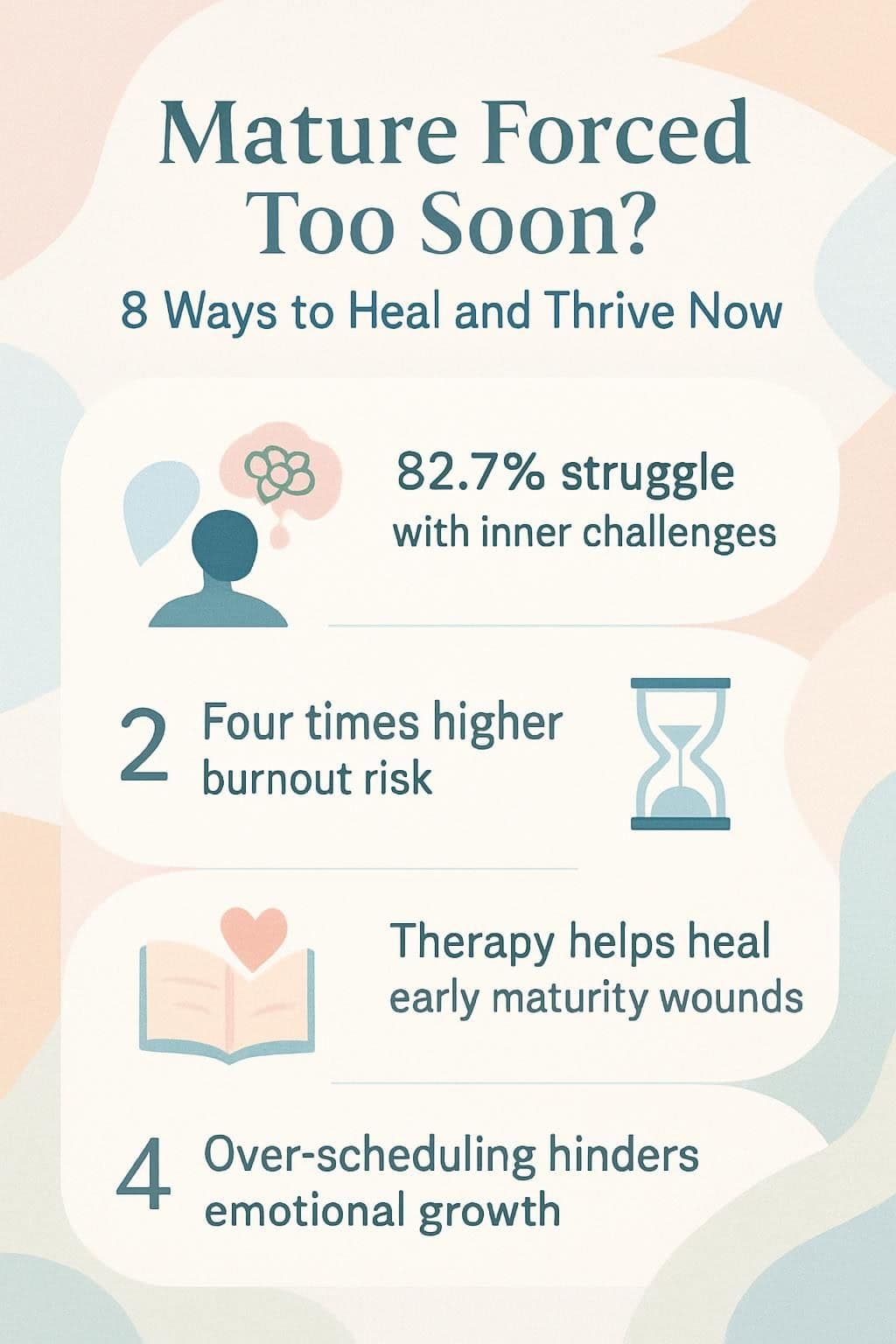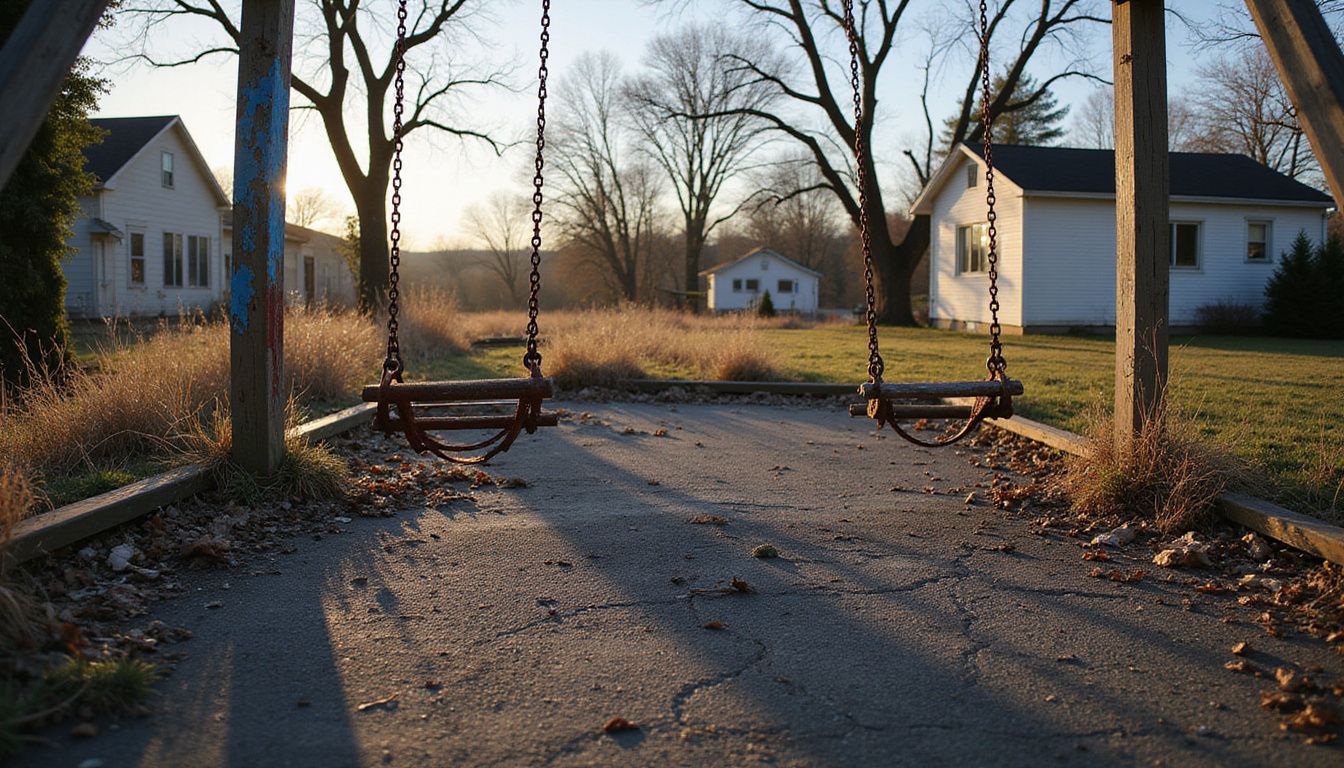Do you feel mature forced too soon, robbed of carefree years and pushed into roles beyond your age? Forced maturity can lead to stress, anxiety, and trouble handling emotions clearly.
In this post, you’ll learn eight practical ways—including therapy tips and healthy support—to heal emotional pain and find joy again. Keep reading to reclaim the growth you’ve missed out on!
Key Takeaways
Growing up too fast causes stress, anxiety, and trouble processing emotions—issues that often persist into adulthood.
Kids who handle adult duties early tend toward perfectionism, making them four times more likely to face burnout later in life.
Around 82.7% of grown-ups who matured early act confident yet quietly battle inner struggles, often dealing with poor boundary-setting and relationship issues.
Therapy offers a safe place to address and heal wounds from early maturity, including effective approaches like CBT, art therapy, and trauma-sensitive methods.
Freeing children’s schedules from too many planned activities gives them essential space for natural growth, fostering balanced emotional health.
Table of Contents
Emotional Impacts of Forced Maturity

Being forced to grow up too soon leaves deep scars on your emotions. Kids who must act like adults miss out on normal feelings and often struggle with stress for years to come.
Increased Stress and Anxiety

Kids who have to grow up too fast often carry heavy stress. I’ve seen this a lot in my therapy work with young women whose childhoods ended early due to family issues. Their bodies stay tense and alert nearly all the time—relaxing becomes almost impossible.
Parents often push these kids into grown-up roles and add even more weight to their shoulders. Many girls describe their hearts racing whenever they face adult tasks they’re not ready to handle.

When childhood gets cut short, unhealthy habits can sneak in early. Girls thrown into adult responsibilities might skip meals, miss out on sleep, or rarely take breaks. These behaviors create ideal conditions for anxiety to set in.
Constantly saying yes, pleasing others, and pushing themselves too hard drains their energy and wears them down. Often, these struggles stick around through adulthood, making stress a regular and unwelcome part of their days.
Difficulty Processing Emotions

Children pushed to grow up too early often struggle handling their emotions in a healthy way. Absent or distant parents leave gaps, forcing children to manage difficult feelings all alone.
This confusion makes it hard for kids to understand what they feel, or where those emotions come from. Many who experienced parentification early on say they ignored their own needs, focusing instead on taking care of everyone else.
Studies confirm the stress of playing family counselor can stall normal emotional growth.
The child who must be their own parent loses the chance to learn how emotions work through being guided by adults who understand them.
Emotional challenges developed in childhood often continue into adult life. Girls especially face pressure from parents who are emotionally checked-out, pushed into roles like “little mothers” at home.
Boys experience a similar issue—known as the son grew up too fast syndrome—though it shows up differently. Both genders might cope poorly, blocking out their emotions or using romance as an escape.
Therapy provides healing, helping adults pick up emotional skills they missed while young. Breaking this pattern involves learning to see feelings as safe, rather than threats to avoid or control.
Social Impacts of Forced Maturity

Children forced to grow up too fast often feel out of place with their peers. They miss out on normal social bonds while they carry adult burdens that set them apart.
Struggles with Peer Relationships

Forced maturity can put a barrier between you and friends your age. Girls who experience parentification often carry adult-level concerns—worries most teens just can’t grasp. This disconnect makes forming regular friendships difficult.
Many young women say they feel “different” or “too serious”, compared to friends who had typical childhood experiences. Feelings of guilt and shame can even make casual meetups tough, especially if you’re dealing with adult tasks at home.
Early adult responsibilities can also cause trust issues later on. The trauma from handling grown-up duties at a young age can make openness feel risky or unsafe. You may hold back in friendships, or feel like no one really understands your situation.
This emotional distance can create painful loneliness during crucial growing-up years. Soon, we’ll discuss how forced maturity affects your place within younger and older friend groups alike.
Isolation from Age Groups

Kids pushed to grow up early often feel distant from friends their age. They miss out on important social events, busy instead with adult chores at home. Soon enough, this distance widens, making it tough to engage with common kid interests—like games or school gossip.
I’ve seen this firsthand while working with youth groups in urban neighborhoods. Recent studies confirm social isolation can boost anxiety and depression risks in children and teens.
Stress hormones, like cortisol, spike during these critical years, harming healthy brain development.
The bridge between childhood and adulthood should be crossed at its natural pace, not rushed across.
Young people caught in this scenario often find comfort in online stores like Amazon or creative platforms like Etsy. They use shopping or creative projects to cope with feelings of loneliness.
Unfortunately, these isolation effects can linger for years, causing trouble in adult relationships later on. Researchers have connected childhood social isolation to increased adult depression rates and ongoing health concerns.
The next part looks closely at how early maturity triggers perfectionism—and how that pressure eventually leads to burnout in adults who missed out on childhood.
Psychological Impacts of Forced Maturity

Growing up too fast leaves deep marks on the mind. Kids forced to mature early often face harsh inner critics and impossible standards.
Development of Perfectionism

Kids who must mature too quickly often develop strict perfectionism as a way to cope. Recent studies reveal that 27.6% of children show high levels of perfectionism—and surprisingly, boys score higher on these measures than girls.
I’ve noticed this too, in my therapy sessions, especially with kids made to take on adult roles at an early age. They tend to set impossible standards for themselves, striving to control everything.
Self-oriented Perfectionism-Critical, a style where kids are tough on themselves, strongly relates to higher levels of emotional distress and stress symptoms. The heavy need to be perfect creates a harmful cycle that sticks around well past childhood.
Many clients describe it as feeling they’re always one small mistake away from disaster—like walking on a tightrope without a safety net. Often, this mindset comes from childhood trauma or abuse, where acting perfectly seemed necessary for survival.
This burden of needing to be perfect usually triggers anxiety and burnout later on, making professional help essential. In therapy, kids can learn to build healthier and more realistic ways of thinking, shedding that exhausting pressure bit by bit.
Risk of Burnout

People who are forced to grow up too quickly face a high risk of serious burnout. The World Health Organization now officially recognizes burnout as a genuine condition affecting parents and primary caregivers.
Over the years, working closely with young adults required to mature early, I’ve noticed this troubling trend firsthand. Statistics show primary caregivers experience burnout four times more often than other adults—often feeling extremely exhausted and easily irritated.
These symptoms strongly resemble what happens to individuals who miss critical phases of normal childhood:
Burnout doesn’t just happen to adults in careers—it happens to those who never got to be children first.
The emotional burden creates the ideal conditions for emotional collapse. Many people who survive early trauma build coping habits centered on perfection and overcommitment. This harmful cycle triggers physical signs such as headaches, sleep troubles, and weakened immunity.
Changing this damaging cycle involves recognizing one’s own struggles and tapping into supportive relationships. Honest conversations about burnout can ease the pressure, similar to helpful approaches encouraged for exhausted caregivers.
Effects on Personal Development

Forced early maturity stunts growth in ways we rarely see on the surface. Kids who grow up too fast miss key parts of childhood that shape who they become as adults.
Suppression of Childhood Experiences

Adults who grew up too quickly often bury their real feelings and needs. Kids suddenly pushed into adult roles can miss out on fun, playful childhood experiences. Ignoring these basic emotional needs often creates deeper hurts that surface later in adulthood.
Research links higher levels of family dysfunction with lower adult self-esteem. Early struggles like these can feel like wearing tight leather belts—always holding back natural growth and expression.
People who faced trauma or sexual abuse during childhood frequently find it hard to connect with their inner child. Around 82.7% of adults say they appear confident on the outside, yet secretly, many carry hidden pain.
Scenes such as the mom crying in bed become familiar, as adults begin dealing with lost moments from their past.
Therapy can provide safe places for survivors to explore these buried experiences. Making space now for playful activities and joyful moments can help restore what’s been missing for so long.
Accelerated Responsibility Acceptance

Losing out on childhood joys isn’t the only price many kids pay. Often, they’re forced into grown-up roles far too soon. Taking on adult responsibilities during childhood sends shockwaves through their emotional growth.
Girls might find themselves caring for younger siblings—or even their own parents. Boys, too, hear they’re suddenly “the man of the house”, long before they’re ready. Early exposure to adult duties can slow down emotional maturity in critical ways.
The weight of premature responsibility doesn’t build character – it builds walls around the heart.
Research shows those who grow up too quickly often have trouble setting clear boundaries as adults. They regularly put the needs of others above their own, causing emotional exhaustion and hidden anger.
Popular fiction, like dark romance or romantic suspense novels, frequently tackles these emotional struggles. Characters in these stories deal honestly with past hurts. Reading such stories allows many women to see their own experiences reflected, reducing feelings of isolation.
Moving forward means spotting harmful patterns early, and finding a healthy middle ground between caring for others and taking care of yourself.
Long-Term Consequences

Forced maturity leaves deep scars that can last decades into adulthood. These wounds often show up as trouble saying “no” to others and forming healthy bonds with partners or friends.
Difficulty Establishing Boundaries

People who had to grow up quickly often find it hard to set clear personal boundaries. I faced this myself, having taken on adult responsibilities early in life. Losing a sense of self happens easily if we can’t say “no” to demands that breach our comfort levels.
Many women end up feeling unsafe in relationships, simply because they never learned how to guard their own space. This often results in putting others first constantly, and then feeling guilty about expressing their own needs.
Clear boundaries should begin early in any new relationship, to avoid confusion or hurt down the road. Too many of us rely heavily on what others think of us, since we’ve never learned to value our own emotions or instincts.
This habit damages friendships, interferes with work, and weakens romantic bonds. Getting advice from a counselor or therapist can provide practical tools to overcome these patterns and understand why we struggle with boundary-setting.
Building the skill of protecting oneself takes ongoing effort—but it can lead directly to increased self-respect and better, safer relationships.
Challenges in Adult Relationships

Adult relationships can face tough challenges as we get older. Divorce rates among couples over 50 continue to rise, indicating how passing years add pressure to even strong partnerships.
Issues like jealousy or cheating can quickly erode trust—it only takes a single secret text from a coworker to shake everything up. I’ve watched friends battle deep hurt after discovering their partner was hiding messages.
Health issues can cause even more stress, changing the delicate balance in relationships. Caring for a spouse who gets sick can shift roles and expectations in ways no one expects.
Sadly, many pampered adults aren’t ready for these hard adjustments. The strain can even lead to significant personality changes, making everyday interactions tense and difficult.
One woman I know confided that after her husband suffered a stroke, she struggled recognizing him—his mood and daily habits shifted noticeably.
Early adulthood pressures sometimes affect how we manage these relationship hurdles later in life. Folks who had to mature too early often find it tough to set healthy boundaries or voice their feelings openly.
Practicing open communication around sensitive issues, including sexual topics, gives couples tools to handle life’s difficult surprises together.
Coping Mechanisms and Support

Finding help is the first step to heal from forced early maturity. Support groups and mental health pros offer tools to process past pain and build new paths forward.
The Role of Therapy and Counseling

Therapy can help you heal if you had childhood pressures that forced you to grow up too quickly. Having professional support allows you to reconnect with parts of yourself that tough times pushed aside:
- Therapists create safe spaces where you can openly talk about having early responsibilities without shame or guilt.
- Attending counseling sessions regularly helps you recognize childhood experiences that still affect your adult choices, especially if trauma or abuse happened.
- Cognitive Behavioral Therapy gives practical methods to handle anxiety and stress—common struggles for those who matured early.
- Participating in group therapy puts you in touch with others facing the same issues, helping to break feelings of isolation caused by growing up too soon.
- Counselors help you develop clear personal boundaries, something many people struggle with after spending years placing others’ needs above their own.
- Art therapy encourages you to express emotions that might feel too difficult—or too painful—to talk about openly.
- Trauma-informed therapy addresses lingering emotional injuries from the past that pushed you into early maturity.
- Family therapy can mend relationships hurt by reversed roles and heavy family duties during formative years.
- Professional support helps you identify and cope with emotional triggers connected to past responsibilities or pressures.
- Therapy gives you useful techniques to find balance between everyday adult tasks and personal care practices, which people who grew up too fast sometimes overlook.
- Therapists who understand cultural differences can help—especially women with various family expectations, like those from African backgrounds.
- Online counseling makes therapy accessible to people living far away from counselors, even in areas along Linglestown Road.
Building a Support Network
Building a solid support network is crucial for healing from forced early maturity—especially since research confirms more than half of adults wished they had more emotional backing during hard moments like the pandemic.
- Start by honestly reflecting on what you genuinely need from others. Women forced to grow up quickly often find it tough to request help, as they’ve usually been the helpers themselves.
- Write out your current relationships to spot any missing roles or gaps in support. Include family members, friends, coworkers, and local community contacts who give an authentic sense of safety.
- Expand connections outside family circles if trauma from childhood lingers there. Groups supporting survivors of child abuse offer understanding spaces free of judgment.
- Once a week, casually connect with someone new—a quick coffee invite or short message works perfectly. Studies highlight that adding new relationships boosts emotional health.
- Set straightforward boundaries with people in your life. Clearly communicate the exact type of help that works best during challenging times.
- Seek out professional counseling or mental health support. A skilled counselor provides helpful insights that your close contacts can’t always offer.
- Engage with online support networks where women with similar pasts openly connect. These communities offer constant access to understanding, even if local options are limited.
- Schedule regular ways to check-in with your closest circle—a short monthly meetup or simple weekly texts help keep these relationships strong.
- Look to mentors who traveled similar roads and achieved personal healing. Their stories offer genuine proof that things improve over time.
- Accept help from others openly and without guilt. I used to feel uncomfortable about that myself—but once I relaxed into it, I realized this actually made our relationships stronger.
- Build balanced relationships rooted in mutual exchanges, care, and respect. Equal friendships significantly increase your life satisfaction and sense of worth.
- Understand each person fulfills a different purpose in your network. Some friends provide emotional comfort, while others are great with practical support.
Encouraging Healthy Growth

Healthy growth happens when we let kids be kids first, then adults later. You can break harmful patterns by giving yourself space to enjoy simple joys you missed and learn to set clear limits with others.
Importance of Allowing Age-Appropriate Development
Kids need room and time to grow naturally through each stage of life. Rushing children into adult behaviors too early robs them of essential learning—experiences they can’t reclaim later.
In my therapy practice I’ve met young girls reading advanced fantasy books too early, leaving them baffled by confusing relationships in those stories. Every developmental stage has its own specific skills: young kids rely on play to spark creativity, while teens depend on friendships to shape their sense of self.
Society frequently applauds children who act mature beyond their age, missing the hidden drawbacks this can cause. Parents need to create safe environments where children can experience childhood at their appropriate pace, shielded from adult worries and pressures.
That doesn’t mean kids avoid responsibilities—it means choosing tasks suited for their age and development. Skipping crucial childhood phases can lead to struggles later, like trouble setting boundaries or difficulty forming balanced connections as grown-ups.
The following section takes a closer look at ways to help parents balance age-appropriate duties and meaningful freedoms for their kids.
Promoting Balance Between Responsibility and Freedom
Finding balance helps both parents and children truly thrive. Last year, I cut my children’s activities by half and noticed their stress levels drop dramatically within a few short weeks.
Free time gives them space to explore, play, and develop naturally at their own pace. Packing a child’s day with endless organized events can quickly drain away genuine joy. Parents need to confidently step in, saying “no” to overloaded schedules and “yes” to quiet downtime.
Even such a simple change provides breathing room for kids to rest, recharge, and just be themselves.
Free, unstructured playtime encourages stronger, healthier minds than constant classes and planned tasks ever could. With more relaxed afternoons, my daughter began inventing fantasy stories—something she’d never had time for in her previously busy schedule.
Her creative urban fantasy worlds clearly showed how much her imagination required that open space. Children who lead balanced lives tend to have healthier emotional states and perform better academically.
They can better juggle responsibilities and fun, avoiding the early burnout often caused by adult-driven pressures.
How Will the Impacts of Forced Maturity Evolve in 2025?

Experts say healing from forced maturity will get more attention in 2025, as people become more aware of its lasting harm. Many adults carrying wounds from childhood often struggle to build healthy relationships later on.
Women especially describe feeling stuck in caretaker roles, burdened by emotional ties that began way too young, limiting their own growth.
Digital support groups will become more common, giving survivors safe spaces to openly discuss painful childhood experiences. Online communities will help break down old stigmas and silence around childhood trauma.
Mental health apps will include new resources to support those pushed into adulthood early. Programs specifically for women will help them learn how to set healthy boundaries in relationships.
These apps will also help people reconnect with the playful, carefree sides of themselves that got lost along the way.
Social media will also play a big role, sharing more personal stories about overcoming early pressures to grow up too fast. This growing openness around past childhood burdens will shift conversations away from shame toward hope and healing.
People Also Ask
What does being “mature forced too soon” mean?
Being “mature forced too soon” means a kid must handle adult issues before they’re truly ready. It can happen if a child learns about sensitive topics like sex too early, or has to deal with serious family struggles. Kids deserve a chance to grow, play, and just be kids, without heavy responsibilities weighing them down.
How can reading support healing from growing up prematurely?
Reading personal stories about others who faced similar hardships can help ease loneliness. Books offer comfort, guidance, and real-life tips to help you heal from experiences of being forced into early maturity. Amazon.com offers several great options from people who have walked the same road.
How does early maturity trauma affect later relationships?
Early maturity trauma can lead to problems trusting others in adulthood. Sometimes people develop an unhealthy connection between intimacy and unhealthy behaviors, like control or bondage. Breaking free from these unhealthy patterns is achievable—with kindness and patience from those who care.
Can therapy help if someone was forced into early maturity?
Therapy offers meaningful support for those who grew up too fast. A therapist can help you process traumatic experiences from childhood—including serious issues like rape or abuse. Talking openly in therapy often opens doors toward healing and allows you to move ahead with your life.
References
https://psychcentral.com/blog/psychology-self/2019/12/trauma-growing-up-fast
https://www.psychologytoday.com/us/blog/social-instincts/202211/how-heal-the-wounds-being-forced-grow-too-early (2022-11-16)
https://pmc.ncbi.nlm.nih.gov/articles/PMC8543788/
https://pmc.ncbi.nlm.nih.gov/articles/PMC7312165/
https://www.apa.org/monitor/2021/10/cover-parental-burnout
https://digitalcommons.liberty.edu/cgi/viewcontent.cgi?article=6661&context=doctoral
https://pmc.ncbi.nlm.nih.gov/articles/PMC2702123/
https://www.ncbi.nlm.nih.gov/books/NBK402020/
https://www.medicalnewstoday.com/articles/how-to-set-boundaries (2022-11-24)
https://pmc.ncbi.nlm.nih.gov/articles/PMC10644207/
https://www.helpguide.org/relationships/social-connection/attachment-and-adult-relationships (2025-03-13)
https://www.columbiapsychiatry-dc.com/counseling-blog/developing-healthy-coping-mechanisms-2/
https://mywellbeing.com/therapy-101/how-to-build-a-support-system
https://pmc.ncbi.nlm.nih.gov/articles/PMC10946933/
https://raisedgood.com/extraordinary-things-happen-when-we-simplify-childhood/
https://www.psychologytoday.com/us/blog/living-with-emotional-intensity/201912/did-you-have-to-grow-up-too-soon (2019-12-12)
